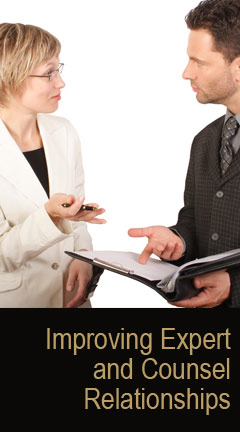Archival Notice
This is an archive page that is no longer being updated. It may contain outdated information and links may no longer function as originally intended.
Home | Glossary | Resources | Help | Course Map
Several proposed codes of conduct for attorneys who deal with expert witnesses are in the drafting stages. One such code encompasses 11 major points to assist in the attorney-expert witness relationship. A Proposed Code of Conduct, American Academy of Forensic Sciences, Jurisprudence Section.
Although the AAFS code has not yet been adopted, members of both professions feel that the level of performance, conduct and ethical relationships must be raised.
The tendered code states that attorneys shall not knowingly proffer to the court an expert with fraudulent credentials. Such conduct would certainly subject an attorney to severe sanctions, if not criminal penalties.
In addition, the American Bar Association has published Standards for Criminal Justice. This publication includes both prosecution and defense standards for dealing with experts. It emphasizes the expert's independence and the need for impartiality.
Typical of the effort to improve the relationship between attorneys and forensic witnesses is the development, in several states, of interprofessional guides for expert witnesses and lawyers. The purposes of these guides are to:
- Promote better understanding between lawyers and expert witnesses.
- Improve communication between them.
- Minimize disputes.
Additional Online Courses
- What Every First Responding Officer Should Know About DNA Evidence
- Collecting DNA Evidence at Property Crime Scenes
- DNA – A Prosecutor’s Practice Notebook
- Crime Scene and DNA Basics
- Laboratory Safety Programs
- DNA Amplification
- Population Genetics and Statistics
- Non-STR DNA Markers: SNPs, Y-STRs, LCN and mtDNA
- Firearms Examiner Training
- Forensic DNA Education for Law Enforcement Decisionmakers
- What Every Investigator and Evidence Technician Should Know About DNA Evidence
- Principles of Forensic DNA for Officers of the Court
- Law 101: Legal Guide for the Forensic Expert
- Laboratory Orientation and Testing of Body Fluids and Tissues
- DNA Extraction and Quantitation
- STR Data Analysis and Interpretation
- Communication Skills, Report Writing, and Courtroom Testimony
- Español for Law Enforcement
- Amplified DNA Product Separation for Forensic Analysts


